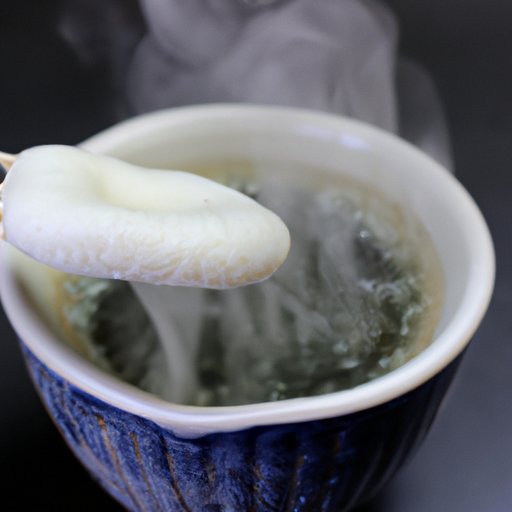
Introduction
Throat mucus, also known as phlegm, is a common symptom of a sore throat, cold, or flu. It is produced by the respiratory system to lubricate and protect the airways. Although it is a natural immune response, too much throat mucus can be annoying and affect daily life. In this article, we will explore different ways to get rid of throat mucus, ranging from natural remedies, dietary changes, to quitting smoking and avoiding irritants.
Natural Remedies for Throat Mucus
Natural remedies can help soothe the throat and loosen mucus. Here are some of the most effective ones:
Honey
Honey has been used for centuries for its antibacterial and anti-inflammatory properties. It can help soothe the throat and reduce coughing by forming a protective film. A teaspoon of honey before bedtime can improve sleep quality and help relieve a sore throat caused by throat mucus.
Lemon and Ginger Tea
Lemon and ginger tea is another popular remedy for throat mucus. Lemon is high in vitamin C and antioxidants, which can boost the immune system. Ginger, on the other hand, has antimicrobial and anti-inflammatory properties that can alleviate throat discomfort. Adding a teaspoon of honey to the tea can increase its effectiveness.
Steam Inhalation
Steam inhalation can help loosen mucus in the nasal passages and chest. Boil a pot of water, place a towel over the head, and inhale the steam for 10-15 minutes. Adding essential oils such as eucalyptus or peppermint can enhance the experience and provide additional benefits.
Saline Water Gargle
Gargling with saline water can help remove excess mucus and provide relief for a sore throat. Mix half a teaspoon of salt in a cup of warm water, gargle for 30 seconds, and spit it out. Repeat several times a day as needed.
Dietary Changes that Might Help
What we eat can also affect the production and consistency of throat mucus. Here are some dietary changes that might help:
Being Mindful of What Food to Consume
Foods high in fat and sugar can promote mucus production. On the other hand, foods high in fiber and protein can reduce inflammation and improve immune function. Examples include whole grains, lean protein, nuts, seeds, fruits, and vegetables.
Avoiding Dairy Products and Spicy Foods
Dairy products are known to increase mucus production, particularly for those who are lactose intolerant. Spicy foods, on the other hand, can irritate the throat and worsen coughing. It’s best to avoid these foods when experiencing excessive throat mucus.
Increase in Consuming Fruits and Vegetables
Fruits and vegetables are rich in vitamins, minerals, and antioxidants that can support the immune system and reduce inflammation. Incorporating them into the diet can help prevent or alleviate throat mucus.
Hydration
Drinking enough water is crucial for overall health and can help keep mucus thin and easier to expel. Dehydration can thicken mucus, making it harder to remove from the body. Drinking warm liquids such as herbal tea, soup, or warm water with lemon can also provide additional relief.
Over-the-Counter Medications
There are several over-the-counter medications that can alleviate throat mucus. These include:
Antihistamines and Decongestants
Antihistamines and decongestants can reduce mucus production and relieve congestion. They are available in various forms such as tablets, liquids, and nasal sprays. It’s important to read the labels and follow the recommended dosage to avoid side effects.
Quit Smoking
Smoking is one of the most significant factors that contribute to throat mucus. It damages the respiratory system and decreases lung capacity, making it harder to expel mucus. Quitting smoking can help alleviate throat mucus and improve overall health.
Avoiding Irritants
Avoiding irritants such as air pollution, chemicals, and perfumes can also reduce throat mucus. These irritants can trigger allergies and inflammation, leading to excessive mucus production. Here are some tips on how to avoid exposure:
- Avoid smoking or being around smokers
- Use air purifiers or filters
- Avoid harsh chemicals and cleaning products
- Avoid perfumed products such as candles or air fresheners
When to Visit a Doctor
Most cases of throat mucus can be treated with home remedies and lifestyle changes. However, in some cases, medical intervention might be necessary. Seek medical help if you experience:
- Fever or chills
- Difficulty breathing
- Blood in mucus
- Chest pain
- Persistent symptoms that don’t improve after a week
A doctor can provide a proper diagnosis and recommend appropriate treatment depending on the underlying cause of the throat mucus.
Conclusion
Throat mucus is a common symptom that can affect our daily life. Natural remedies, dietary changes, hydration, over-the-counter medications, quitting smoking, and avoiding irritants are effective ways to alleviate throat mucus. It’s important to take care of our throat and overall health to prevent excessive mucus production and other health complications. Seek medical help if necessary, and always consult with a healthcare professional before trying any new treatment.





